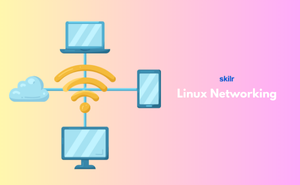👇 CELEBRATE CLOUD SECURITY DAY 👇
00
HOURS
00
MINUTES
00
SECONDS

Linux Networking is the practice of using the open-source Linux operating system for managing IT networks with Linux's networking related features. The practice involves routing, packet filtering, firewall settings, and network interface configuration. Linux is extensively used for providing network related services as servers, cloud computing, and corporate servers (for email, security, etc.) due to its reliability and flexibility.
Certification in Linux Networking validates your skills and knowledge to configure, troubleshoot, and manage Linux-based network systems.
Why is Linux Networking certification important?
Who should take the Linux Networking Exam?
Linux Networking Certification Course Outline
The course outline for Linux Networking certification is as below -
Industry-endorsed certificates to strengthen your career profile.
Start learning immediately with digital materials, no delays.
Practice until you’re fully confident, at no additional charge.
Study anytime, anywhere, on laptop, tablet, or smartphone.
Courses and practice exams developed by qualified professionals.
Support available round the clock whenever you need help.
Easy-to-follow content with practice exams and assessments.
Join a global community of professionals advancing their skills.
You will need:
The course is self-paced, and completion time depends on your learning speed:
This course is designed to provide a beginner-friendly introduction to Linux network administration. You will learn how to set up a Linux environment, configure network settings, manage file transfers, and troubleshoot network issues. The course covers network interface configuration, NIC bonding, file transfer methods like SCP and rsync, remote access using SSH and Telnet, and network troubleshooting with traceroute.
This course will help you prepare for various networking and system administration roles in IT. Some of the key job opportunities include:
Yes! Linux networking skills are highly valued by employers. To improve your job prospects:
No, this course is beginner-friendly. However, basic knowledge of computers and Linux will be helpful. If you have some experience using a command-line interface (CLI), you will find it easier to follow.
Salaries depend on experience, location, and job role, but here are some general estimates:
Linux networking skills are in high demand across many industries, including:
By completing this course, you will: